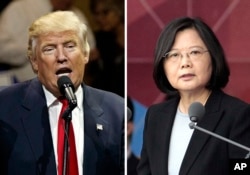U.S. President-elect Donald Trump and the leader of Taiwan put China on the defensive late Friday with a historic, upbeat phone call to discuss Washington’s role in possibly helping the diplomatically isolated island gain international status.
China’s foreign minister dubbed the 12-minute phone call by Taiwan President Tsai Ing-wen a “petty action” that will lead to no changes in Sino-U.S. relations.
But the communist leadership will watch for fallout, such as whether Trump talks again with Taiwan after his Jan. 20 inauguration or gives Taiwan some of what its president suggested on the call, experts predict.
“It serves notice to Beijing that Washington chooses to do what’s beneficial to Washington,” said Raymond Wu, managing director of Taipei-based political consultancy e-telligence. “It’ll do that whether it’s in terms of substantive issues or symbolic gestures.”
Although Washington is a supporter of Taiwan, there has been no contact between leaders of the two countries since the U.S. formally broke off diplomatic relations in 1979 out of deference to China, which regards Taiwan as a breakaway province. Since Trump's phone call however, some Republican lawmakers have largely embraced his contact with Taiwan's leader.
"I commend President-elect Trump for his conversation with President Tsai Ing-wen, which reaffirms our commitment to the only democracy on Chinese soil," said a statement from Senator Tom Cotton, a Republican from the midwestern state of Arkansas. "I have met with President Tsai twice and I'm confident she expressed to the president-elect the same desire for closer relations with the United States."
Several other Republican lawmakers backed up Trump's phone call, including Arizona Congressman Matt Salmon, who chairs the House Foreign Affairs subcommittee on Asia and the Pacific.
"America has always been a champion of democratic values and individual freedoms, and I applaud the President-elect for making a strong statement in support of those values around the world,” Salmon told The Hill.
Former U.S. ambassador to the United Nations John Bolton also praised the call, arguing that the U.S. should shake up its relationship with China, which he accused of making "aggressive ... beligerent claims in the South China Sea."
"Nobody in Beijing gets to dictate who we talk to. It's ridiculous to think that the phone call upsets decades of anything," Bolton said Saturday on Fox News' morning show Fox and Friends, noting that he believes a president should be able to speak with any foreign leader he wants if he thinks it is in the best interest of America.
Beijing, Taipei relations
China has claimed sovereignty over Taiwan since the Chinese civil war of the 1940s and forbids its more than 170 diplomatic allies, including the United States, from making official contact with the Taiwanese leadership. But Washington has remained a staunch informal supporter of the self-ruled, democratic island since it cut diplomatic ties in 1979 in favor of economically more powerful China.
On the call - a first between a Taiwan leader and a U.S. president-elect since the 1970s - Tsai said her government wanted stronger ties with the United States, according to a statement from her office Saturday. She particularly asked for U.S. help increasing Taiwan’s international exposure.
“The president…told Trump that in the future she hopes that on the question of international relations, the U.S. side can continue to help Taiwan have more chances to participate and make contributions,” the statement said.
China bars Taiwan from joining international organizations such as the United Nations if they require statehood as a prerequisite. Diplomatic isolation is a sore point for Taiwan’s public, which has leaned on the president to push for change. Lack of formal ties abroad has also made it hard to sign trade deals with other countries.
Tsai wants a “strengthening of security” in Taiwan to “let people have a better life and guarantee of safety,” she added on the call.
Washington and Taipei
The U.S. government has sold Taiwan advanced weapons in the past despite opposition from China, which is 160 km away and believed to have missiles aimed in its direction. China insists the two sides eventually reunify and does not rule out use of force if needed.
China and Taiwan have not agreed on how to talk with each other, keeping relations on hold since Tsai took office May 20.
Taiwanese people will cheer the contact with Trump because they normally lack high-level contact with the United States, said Alexander Chiang, associate professor of international politics with National Chengchi University in Taipei.
The call further shows that Trump may not care whether Beijing demands that the United States ignore Taiwan, said Sean King, senior vice president with the New York political consultancy Park Strategies. Trump, a New York real estate billionaire, lashed out at China during his campaign, though he tempered those comments after winning the election Nov. 8.
But if Trump contacts Tsai while in office, China is likely to grow angrier and say his government violated a deal that bars official U.S. relations with Taiwan. “If anything, Beijing's predictable outrage will probably make (Trump) even happier he did it,” King said.





